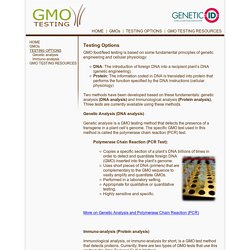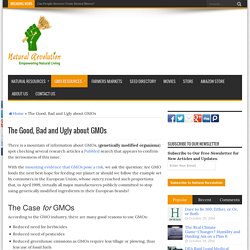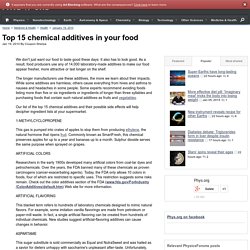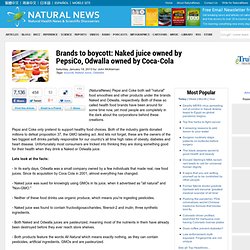

- Testing Options. GMO food/feed testing is based on some fundamental principles of genetic engineering and cellular physiology: DNA: The introduction of foreign DNA into a recipient plant’s DNA (genetic engineering) Protein: The information coded in DNA is translated into protein that performs the function specified by the DNA instructions (cellular physiology) Two methods have been developed based on these fundamentals: genetic analysis (DNA analysis) and Immunological analysis (Protein analysis).

Three tests are currently available using these methods. Genetic Analysis (DNA analysis) Genetic analysis is a GMO testing method that detects the presence of a transgene in a plant cell’s genome. The specific GMO test used in this method is called the polymerase chain reaction (PCR) test. Polymerase Chain Reaction (PCR Test): The Good, Bad and Ugly about GMOs - Natural Revolution. There is a mountain of information about GMOs, (genetically modified organisms) spot checking several research articles a PubMed search that appears to confirm the seriousness of this issue.

With the mounting evidence that GMOs pose a risk, we ask the question: Are GMO foods the next best hope for feeding our planet or should we follow the example set by consumers in the European Union, whose outcry reached such proportions that, in April 1999, virtually all major manufacturers publicly committed to stop using genetically modified ingredients in their European brands? The Case for GMOs According to the GMO industry, there are many good reasons to use GMOs: 10 studies proving GMOs are harmful? Not if science matters. Top 10 Genetically Modified Food Products. Genetic Engineering Companies. This is a short list of some of the commonly known private companies that are developing genetically engineered crops.

It is not an exhaustive list of all companies, but it should help you get familiar with some of them. Also, genetic engineering in agriculture is not exclusively done by private companies – many public organizations and nonprofits are also developing the technology. The Big Six These six companies are the major players in agricultural genetic engineering in the private sector. Where GMOs Hide in Your Food. Non-GMO Project. Top 15 chemical additives in your food. We don't just want our food to taste good these days: It also has to look good.

As a result, food producers use any of 14,000 laboratory-made additives to make our food appear fresher, more attractive or last longer on the shelf. The longer manufacturers use these additives, the more we learn about their impacts. While some additives are harmless, others cause everything from hives and asthma to nausea and headaches in some people. Some experts recommend avoiding foods listing more than five or six ingredients or ingredients of longer than three syllables and purchasing foods that contain such natural additives as fruits and vegetables.
Our list of the top 15 chemical additives and their possible side effects will help decipher ingredient lists at your supermarket. Cloned meat betrayal: Unlabelled products to go on sale after minister sabotages Europe's ban call. By Sean Poulter Updated: 07:46 GMT, 30 March 2011 A campaign to put controls on cloned meat and milk was killed off yesterday by the UK Government and Brussels.

GMO Crops Super-Weed Time Bomb Explodes « Wake-up Call. Superweeds infest a corn field Institute of Science in Society.

GMO's. Brands to boycott: Naked juice owned by PepsiCo, Odwalla owned by Coca-Cola. (NaturalNews) Pepsi and Coke both sell "natural" food smoothies and other products under the brands Naked and Odwalla, respectively.

Both of these so called health food brands have been around for some time now, yet most people are completely in the dark about the corporations behind these creations. Pepsi and Coke only pretend to support healthy food choices. Both of the industry giants donated millions to defeat proposition 37, the GMO labeling act. GMO's IN TNE NEWS. The Cornucopia Institute March 30th, 2011 Lawsuit Filed To Protect Themselves from Unfair Patent Enforcement on Genetically Modified Seed Action Would Prohibit Biotechnology Giant from Suing Organic Farmers and Seed Growers If Innocently Contaminated by Roundup Ready Genes NEW York: On behalf of 60 family farmers, seed businesses and organic agricultural organizations, the Public Patent Foundation (PUBPAT) filed suit today against Monsanto Company challenging the chemical giant’s patents on genetically modified seed.

The organic plaintiffs were forced to sue preemptively to protect themselves from being accused of patent infringement should their crops ever become contaminated by Monsanto’s genetically modified seed. Monsanto has sued farmers in the United States and Canada, in the past, when there are patented genetic material has inadvertently contaminated their crops. Herbicide resistant weeds in a GM field « Thomas' Plant-Related Blog. Not the way that you might think or fear, though.

Genetically modified crops face public resentment, especially in Europe, perhaps simply as a figurehead of big corporate agriculture. The GOOD GUYS. » Consumer rejection kills GM enviropig as farmers feared pork market collapse Alex Jones. Market pressure drove researchers to abandon biotech pig ‘contending’ to be first approved GM meat on consumer plates.

Aaron Dykes Infowars.com April 5, 2012 In a victory against biotech, Canada’s Ontario Pork has announced its decision to cut funding and stop research for the enviropig, genetically-engineered to produce less phosphorous in manure, in effort to reduce the environmental impact of raising pigs. “[Enviro-pig] certainly does not have the public’s support,” Lucy Sharatt, Coordinator of the Canadian Biotechnology Action Network (CBAN) said, later adding that the Canadians widely reject GM products. “It threatens pork markets. It’s clear the public does not want genetically-modified food animals, said Paul Slomp, Youth Vice-President of the National Farmers Union, in the same press conference. Rebecca Rupp: I’m Pro-GMO and Here’s Why – The Plate: Rebecca Rupp. We all know that there are topics that are best to avoid at public dinners. Religion and politics usually top the list because we’ve all seen the awful effect these can have on family Thanksgivings.
Invasive inquiries about age, weight, and personal finances are no-nos, and asking someone if they’re pregnant, especially if they’re not, can be a fast track to social disaster. Increasingly, though, these days, another addition to the to-be-avoided list is the touchy subject of genetically modified organisms (GMOs)—predominately in the form of bioengineered foods. Impassioned rhetoric between pro-GMO and anti-GMO camps brings to mind the murderously hostile Montagues and Capulets, Campbells and MacDonalds, and Hatfields and McCoys. Non GMO Project. Monsanto -"The Devil behind a Mask" GMOs could cause 'irreversible termination of life' on Earth, risk expert warns.
(NaturalNews) When discussing the issues surrounding genetically modified organisms (GMOs) -- that is, organisms bearing the genetic traits of other species or bacteria -- the focus is typically on how safe (or unsafe) these novel, food-like products are for humans. But distinguished risk engineer and two-time best-selling author Nassim Taleb thinks an even bigger problem with GMOs is their threat to the planet, and the statistical likelihood that they will eventually lead to the collapse of life on Earth. In a new study, which is still in draft form, this professor of risk engineering from New York University uses statistical analysis to make the case that GMOs, by their very nature, will disrupt the ecosystems of this planet in ways that mankind is only just beginning to comprehend.